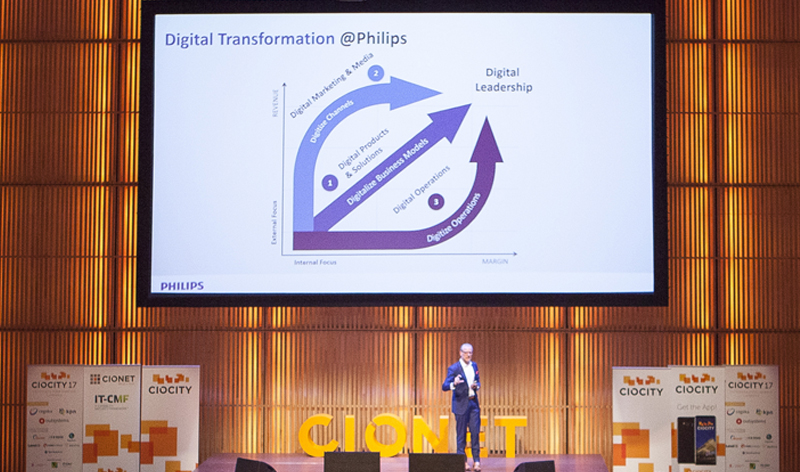
When so many established companies struggle to keep up with a fast paced changing world and so many others have defaulted in the past decades it is a wonder how Philips has managed to not only to survive, but also to stay relevant and keep thriving.
As Blake Cahill, Philips’ Global Head of Digital Marketing, shared in his presentation during CIOCITY17, digital transformation in a global company with 10 business groups and 17 markets across 100 countries is not a straightforward task and the sheer number of stakeholders that need to be involved makes any decision process too slow for this digital world. Not even if, like Philips, a company has already been through several reinventions of itself. In reality, no matter how complex the challenges may be, “if you don’t disrupt yourself, you will be disrupted and die”, mentioned Blake Cahill.
Firstly, there must be a shared understanding about digital and, at Philips, it is based on three interconnected pillars:
These pillars must be actively and continuously driven by one consistent vision – "Making Life Better", in the case of Philips – to not only generate revenue and margin, but also to avoid the pitfalls of innovation for the sake of innovation which would undermine the company’s sustainability through the next 126 years.
Although this integrated understanding of digital from a technology perspective is fundamental, it is not enough. Digital transformation requires a cultural change, capable and invested people and, naturally, change management.
According to Blake Cahill, this meant going beyond the involvement of the C-suite, who were already very much behind (and invested in) the digital transformation process, and starting to unlock the hearts and minds of all the business and market leaders. So, if in the beginning there was a need to centralize control to ensure consistency and efficiency across businesses, markets and channels, after some key initiatives, people gradually started stepping up and as their capabilities evolved, earning the right to start driving digital transformation without such tight controls.
Has Philips completed its digital transformation process? Not in a million bits. Digital is never done and as what could have been dismissed as inconsequent a couple of years ago can suddenly become mainstream, businesses must keep on moving fast and purposeful to continue being successful.
If you want to have a closer look inside a digitally transforming Philips and learn from Blake Cahill’s experience throughout the process, just watch his full presentation made during CIOCITY17.
No Comments Yet
Let us know what you think